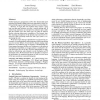Free Online Productivity Tools
i2Speak
i2Symbol
i2OCR
iTex2Img
iWeb2Print
iWeb2Shot
i2Type
iPdf2Split
iPdf2Merge
i2Bopomofo
i2Arabic
i2Style
i2Image
i2PDF
iLatex2Rtf
Sci2ools
144
click to vote
POPL
2012
ACM
2012
ACM
The ins and outs of gradual type inference
Gradual typing lets programmers evolve their dynamically typed programs by gradually adding explicit type annotations, which confer benefits like improved performance and fewer run-time failures. However, we argue that such evolution often requires a giant leap, and that type inference can offer a crucial missing step. If omitted type annotations are interpreted as unknown types, rather than the dynamic type, then static types can often be inferred, thereby removing unnecessary assumptions of the dynamic type. The remaining assumptions of the dynamic type may then be removed by either reasoning outside the static type system, or restructuring the code. We present a type inference algorithm that can improve the performance of existing gradually typed programs without introducing any new run-time failures. To account for dynamic typing, types that flow in to an unknown type are treated in a fundamentally different manner than types that flow out. Furthermore, in the interests of back...
POPL 2012 | Programming Languages | Programming Languages Processors | Static Type System | Type Inference Algorithm |
| Added | 25 Apr 2012 |
| Updated | 25 Apr 2012 |
| Type | Journal |
| Year | 2012 |
| Where | POPL |
| Authors | Aseem Rastogi, Avik Chaudhuri, Basil Hosmer |
Comments (0)

